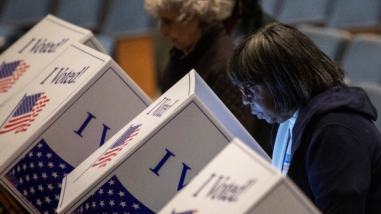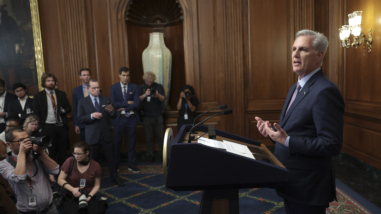Building trust in our nation’s institutions: Q&A with Chayenne Polimédio


Chayenne Polimédio
In March, Chayenne Polimédio joined the U.S. Democracy Program as a program officer. Chayenne leads our National Governing Institutions grantmaking, aimed at strengthening the capacity of our nation’s legislative and executive branches and building public trust.
Chayenne shares more about her background and passion for promoting resilient governing institutions, how her time as a grantee is informing her new role as a grantmaker, and what is giving her hope for our democracy.
What does “democracy” mean to you?
As the child of a new democracy, I grew up watching the growing pains of Brazil’s democratic institutions as they emerged from the long shadow of a military dictatorship. For me, democracy was never a given or something to expect, but something to fight for and preserve. This experience has given me a unique perspective and motivated me to devote my career to promoting resilient governing institutions and rebuilding trust in the government of my adopted home country the United States.
Since then, I’ve worked to promote and support new ideas to reform American democracy such as increasing legislative and executive branch expertise, capacity, and effectiveness as well as pushing for ideas that ensure that people engage with government in ways that are inclusive, transparent, and responsive. Over time — as a Hewlett grantee for much of my career — I’ve learned that the work to promote and preserve democracy and its institutions is unrelenting and long-term.
What questions are you bringing to this work as you move from being on the grantee to the funder side of this table?
Today, the executive and legislative branches of our government are caught in a cycle of mistrust: they’re unable to meet the public’s needs and have lost the faith of the people which, in turn, makes it harder for them to deliver for Americans. Our institutions need to break free from this loop. This work isn’t easy, of course, but I also see a tremendous opportunity: Our nation’s legislative and executive branches of government can earn back the confidence of the American people if they’re able to fulfill their responsibilities in the 21st century. In order to do so, they need to have committed leadership, a high-quality workforce, technological sophistication, and expertise. Moreover, an effective Congress and a federal government that delivers for the people shouldn’t be partisan pursuits. I’m excited to find more opportunities to build bridges among those with different points of view to help define what we want from these institutions and how we can help them get there.
One good example of what successful coalition-building looks like is the work that the organizations in the Fix Congress Cohort did to support the House’s Select Committee on the Modernization of Congress over the last few years. The organizations that were part of the cohort — many of them Hewlett grantees — lent their expertise and commitment to building a strong legislative branch to support the Committee’s mandate to “investigate, study, make findings, hold public hearings, and develop recommendations to make Congress more effective, efficient, and transparent on behalf of the American people.” Over time, the Committee has approved almost one hundred recommendations to improve the technology, human resources, onboarding process, and accessibility of the House. These changes have had and will continue to have a long-lasting impact on Congress’ ability to do its job and to better serve the people.
Another exciting development is Hewlett’s recent expansion of this work into the executive branch. I’m excited to dig deeper into what it might look like to build a strong and knowledgeable civil service, to empower agencies to leverage technology and innovation to fulfill their missions, and to support agency leaders to be stewards of the public’s trust. I’m also looking forward to finding more opportunities to strengthen the executive branch, build trust in governing institutions, and lay the groundwork for more systemic reforms in the future.
What role do you think the Hewlett Foundation can play in providing philanthropic support for U.S. democracy?
I started my career as a Hewlett grantee back in 2014 when the Madison Initiative was launched to address the win-at-all-costs polarization that had come to characterize U.S. politics. Back then, Hewlett was one of the few foundations that saw the importance of the throughputs of democracy: the work of institutions that can make and administer laws and policies that respond to the needs and desires of people.
Thanks to Hewlett’s work to strengthen the legislative branch, today the idea of congressional staff capacity and the negative consequences of the “congressional brain drains” are mainstream. Many of the recommendations that came out of the Select Committee came from organizations that Hewlett has supported for many years, knowing that it is this kind of long-term work that has the biggest potential to be paradigm shifting. This is just one small data point that exemplifies the unique role Hewlett has and can continue to play supporting U.S. democracy, through its commitment to the idea that the great American experiment is one that requires a constant search for improvement and adaptation.
Of course, Hewlett is not alone in this commitment. Over time, I have witnessed exciting growth in the ecosystem of funders interested in the health and capacity of our governing institutions. One exciting recent example has been our work to support the Internal Revenue System’s (IRS) modernization efforts. Over the last few months, we have organized around the idea that modernizing IRS operations and improving its effectiveness is an opportunity to show that government can work smoothly and efficiently for its people. Over the last six months, with the help of the What Works Plus team we have convened a diverse group of foundations and begun to make exploratory investments in organizations to advance and socialize the idea that supporting a modern IRS is an opportunity to rebuild and improve the one federal agency that touches nearly everyone. We’re encouraged by the interest in this work from foundations not only in the democracy, but also the climate, data and technology, and economic policy arenas.
What gives you hope?
I truly believe this is a time of tremendous opportunity for American democracy. Crises can be paralyzing but, if successfully leveraged, they can create tremendous opportunity by fostering innovation and giving us a chance to build coalitions with unlikely allies. Moreover, there is so much that IS working! Congress has passed a wave of bipartisan bills that will have a major and concrete impact on people’s everyday lives for many years to come. There are so many stories of success across agencies in the federal government; of public servants who work tirelessly to be good stewards of the public’s trust.
I see so much energy and commitment from our grantees and peer funders to make our governing institutions work better for the people. The work of the Fix Congress Cohort —which includes many of our grantees committed to a more functional and effective Congress — lives on beyond the Select Committee for the Modernization of Congress through its support of the now Modernization Subcommittee and many other efforts in the House to improve the institution. With the expansion of our strategy to encompass the executive branch, I’ve been inspired by the work of our grantee partners who have driven home the importance of an executive branch that has the talent, skills, and empowerment necessary to transform the government to better respond to and serve the people.
This work is not easy, nor is it quick. But as the examples above show, we’re already moving in the right direction. Public trust in our democracy will grow when the public sees that these institutions can serve the needs and aspirations of all Americans. Ultimately, we want strong institutions that can deliver. I’m excited to bring new voices, new ideas, and new allies together to explore how we can make our national governing institutions better and help democracy make democracy work for the country and the people.



